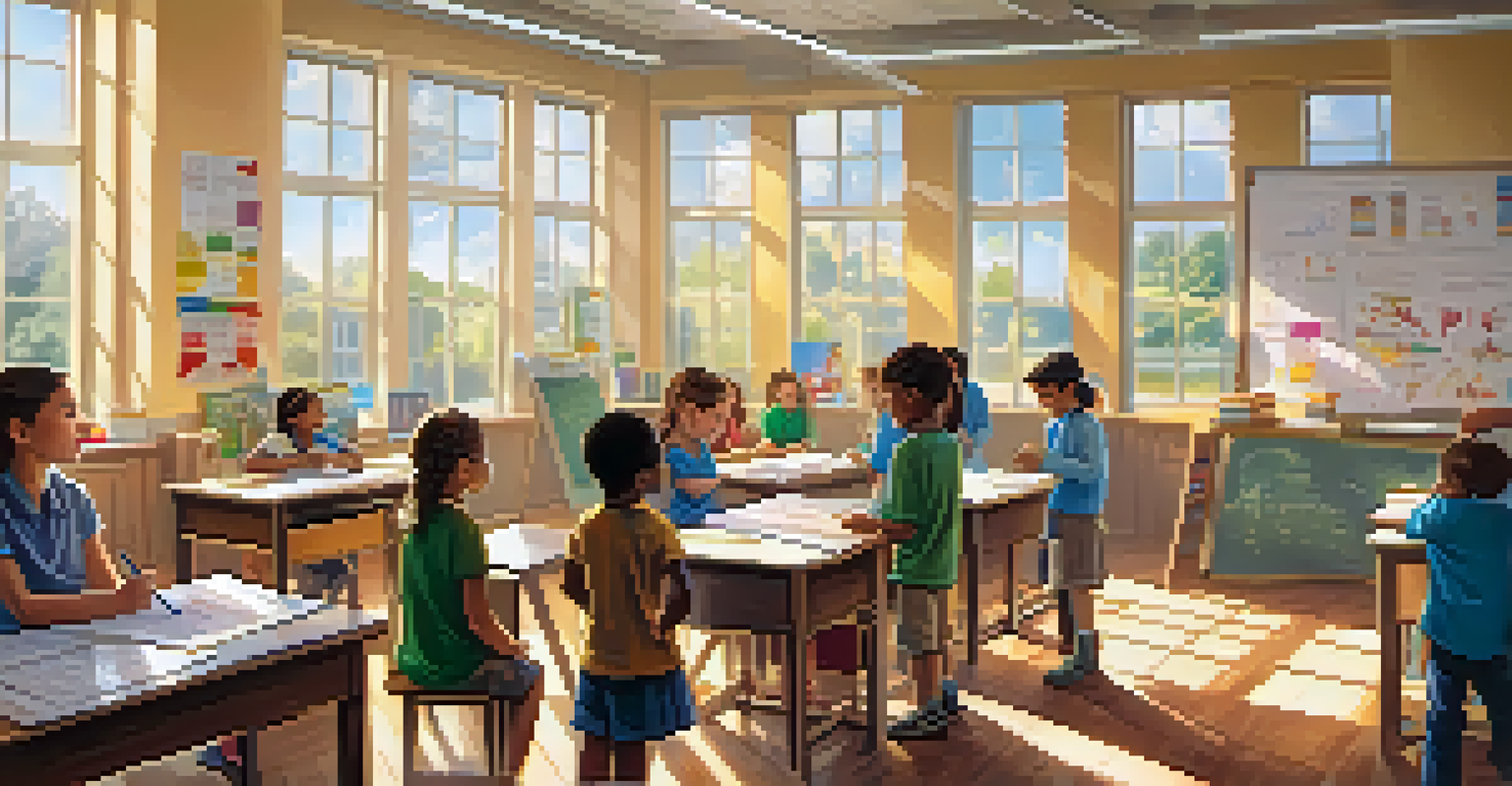Vicarious Learning: Learning Through Others' Experiences

What is Vicarious Learning and Why Does it Matter?
Vicarious learning, also known as social learning, occurs when we learn from others' experiences rather than through direct experience. This concept is rooted in the work of psychologist Albert Bandura, who emphasized the importance of observational learning. Essentially, we can gain insights and knowledge by watching others navigate their challenges and successes.
The greatest gift of human beings is that we have the power of empathy.
This form of learning is particularly relevant in our interconnected world, where sharing experiences is more accessible than ever. By observing the outcomes of someone else's choices, we can make more informed decisions in our own lives. This not only saves time and resources, but it also helps us avoid potential pitfalls.
For example, consider how we often turn to reviews before purchasing a product. By reading about others' experiences, we can gauge whether a product is right for us without having to go through the trial and error ourselves. This highlights how vicarious learning can enhance our decision-making processes.
The Role of Observational Learning in Vicarious Learning
Observational learning is a crucial component of vicarious learning, allowing us to absorb information by watching others. When we see someone succeed or fail, we mentally process those experiences and adjust our future behaviors accordingly. This process is often subconscious, demonstrating how powerful our environment can be in shaping our actions.

Take, for instance, children learning to tie their shoes. They often watch their parents or older siblings perform the task before attempting it themselves. By observing the techniques used, they can replicate the actions more effectively, showcasing how observational learning plays a foundational role in skill acquisition.
Vicarious Learning Enhances Decision-Making
By observing others' experiences, we can make informed choices that save time and resources.
This principle extends beyond childhood learning; adults also engage in observational learning in various contexts, from professional settings to personal relationships. By witnessing how others handle specific situations, we can refine our approaches and expand our skill sets without the need for direct experience.
Real-Life Examples of Vicarious Learning in Action
Consider the impact of social media influencers. Many people follow influencers to learn about products, lifestyle choices, or even fitness routines, illustrating vicarious learning at its finest. By observing these individuals, followers can make informed decisions that align with their own needs and preferences.
Tell me and I forget, teach me and I remember, involve me and I learn.
Similarly, in the workplace, employees often learn from the successes and failures of their colleagues. For instance, a new hire might observe a seasoned employee navigating a challenging project, picking up valuable insights and strategies along the way. This form of informal mentorship can significantly accelerate the learning curve.
In education, vicarious learning can take place through case studies, where students analyze real-world situations to draw conclusions. This method allows learners to grasp complex concepts by seeing how they manifest in practical scenarios, making the learning more relatable and impactful.
Benefits of Vicarious Learning for Personal Growth
Vicarious learning offers numerous benefits, particularly in terms of personal growth and development. By learning from others, we can gain insights into various perspectives and approaches, broadening our understanding of the world. This not only fosters empathy but also promotes adaptability in our own lives.
Moreover, this type of learning can build confidence. When we see others overcome obstacles, it reinforces the belief that we, too, can tackle similar challenges. Knowing that others have succeeded can motivate us to step out of our comfort zones and pursue our goals with renewed vigor.
Observational Learning Shapes Skills
Watching others succeed or fail helps us adjust our behaviors and refine our skills.
Additionally, vicarious experiences can stimulate critical thinking. By analyzing the decisions made by others, we can assess the effectiveness of different strategies, leading us to develop our own problem-solving skills. This reflective process encourages continuous learning and growth.
Challenges of Relying on Vicarious Learning
While vicarious learning has many advantages, it also comes with its challenges. One potential drawback is the risk of misinterpretation. When we observe someone else's experience, we may not fully understand the context or the nuances involved, leading to misguided conclusions.
Additionally, relying too heavily on vicarious experiences can hinder our ability to learn from direct experience. It's essential to strike a balance between learning from others and engaging in hands-on learning ourselves. Without personal experiences, we may miss out on valuable lessons that shape our understanding.
Lastly, there's the issue of information overload. In today's digital age, we are bombarded with stories and experiences from countless sources. This can make it challenging to discern which lessons are most applicable to our own lives, potentially leading to confusion or indecision.
How to Leverage Vicarious Learning Effectively
To make the most out of vicarious learning, it’s important to approach it with intention. Start by identifying role models or mentors whose experiences resonate with you. Follow their journeys, read their stories, and analyze the choices they made—this can provide you with a roadmap for your own path.
Another effective strategy is to engage in discussions with peers or colleagues about their experiences. Sharing insights and lessons learned can foster a deeper understanding of various perspectives and strategies. This collaborative approach can enrich your own learning and expand your knowledge base.
Digital Age Expands Learning Opportunities
Online platforms provide access to diverse insights, enhancing our ability to learn vicariously.
Lastly, reflect on the lessons you’ve learned from others and think critically about how they apply to your life. Consider what worked for them, what didn’t, and how you might adapt those lessons to fit your unique circumstances. This reflective process can turn vicarious learning into a powerful tool for personal development.
The Future of Vicarious Learning in a Digital World
As we move further into a digital age, the opportunities for vicarious learning are expanding exponentially. Online platforms, such as webinars, podcasts, and social media, provide a wealth of experiences to learn from. This accessibility allows us to tap into a diverse range of insights and stories from individuals across the globe.
However, this digital landscape also demands discernment. With so many voices sharing their experiences, it's crucial to critically evaluate the sources and the context of the information we consume. This ensures that we are learning from credible and relevant experiences.

In conclusion, vicarious learning is poised to play an even more significant role in our lives. By harnessing the power of shared experiences, we can continue to grow, adapt, and thrive in an ever-changing world.